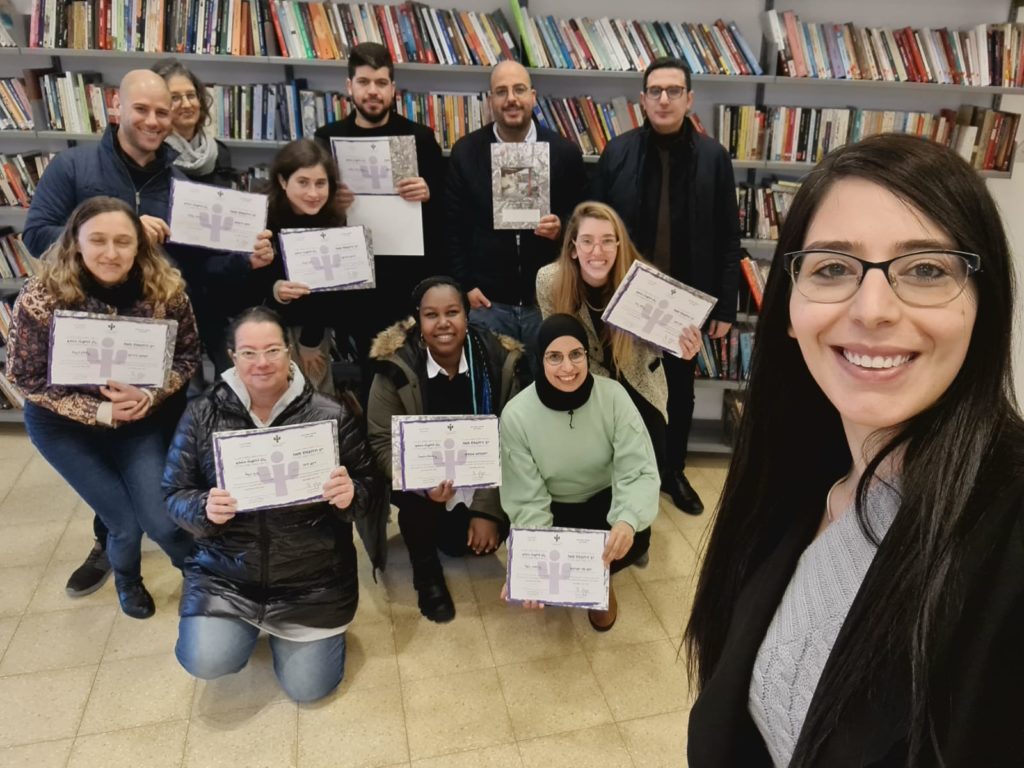I am Willing to Serve in the Army, if Israel Ends the Occupation
Published on Haaretz
Feb 23, 2022
(Raghda is a lawyer, social activist and feminist, a graduate from School for Peace Lawyers as Change Agents Course, cohort of 2021-2022)
Last month, a courageous journey that inspires hope in Jewish-Arabic cooperation, came to a close. A group of Jewish and Palestinian lawyers, all of whom were Israeli citizens, completed a course for lawyers as agents of social change, in the School for Peace at Neve Shalom Wahat Al-Salam – which is dedicated to making Israeli society humane, egalitarian and just. Participants were curious and eager to contemplate and discuss the complex issues of our political reality.
I felt that I must write about this meaningful experience, especially in light of the events of May 2020 – the conflicts in the Negev, the evacuation of Sheikh Jerrah, and protestor arrests and police violence towards Arabic citizens – that have dealt a heavy blow to Palestinian society in Israel, and brought us all to the brink of despair.
Sessions included various topics, focussing mainly on the Israeli-Palestinian conflict and Jewish-Arabic cooperation. Talks were given by lecturers, researchers, and political activists promoting the values of partnership and strengthening Palestinian society. The course also included trips to east Jerusalem and Old Jaffa, which are two areas that Israeli authorities have been rapidly turning more Jewish, causing substantial tensions.
The course was a meaningful and powerful experience for all of us. It gave us an opportunity to rethink these issues in both bi-national and mono-national groups, away from the existing mainstream discourse. During discussions, I have discovered, as have many of my colleagues, that there is much disagreement within the national groups to which we belong. Discussions in the Palestinian group, whose internal debates were already familiar to me, focused on internal criticism, and the responsibility of Arabic society for existing reality despite social disparities. All the Palestinian participants had a very strong and well-integrated sense of Palestinian national identity – so strong, in fact, that our Jewish counterparts noted it, and claimed that it tended to take over the discussion. However, we did diverge along party lines, and our political views would clash when discussing civil and national rights, and Mansur Abas’ political manoeuvres.
We found ourselves gradually discussing more sensitive issues that were not comfortable to broach, such as the Nakba, the occupation, the annexation of the West Bank, Palestinian nationalism, Israel’s Jewish nature, discrimination and racism against Arabs, the Intifada, normalization, Palestinian refugees, and our responsibility for all these things. As the course went on, the discourse itself made participation a challenge for each and every one of us.
But the process helped us trough this, and with each new session we dared to push the limits of discourse further and further. We developed faith in dialogue as a way of dealing with the existing disputes between us, and we managed to get through the discussions while maintaining our national identity as well as accepting that of others. We all agreed that differences are legitimate, important, and should be respected.
Discussions were not easy. When Palestinian participants argued that an independent and sovereign Palestinian nation should be formed, some dissenting voices in the Jewish group resisted the idea, supporting only a demilitarized zone with limited authorities. One of the Jewish participants even went as far as to consistently remind us that we should thank the state of Israel for its treatment and keep quiet!
There is no denying that discussions sometimes made us mad, get up and leave the room, cry, or feel disappointed. We argued with guest lecturers, and rejected their views. Sometimes, we chose to stay quiet, ignore what was being said, and even regret participating at all. But we also knew that both national groups had a right to exist in the shared space. So, although the experience was meaningful, we did not see eye to eye on everything, and people’s experiences varied according to their willingness to go out of their comfort zone.
Could we extrapolate from the experience of this small group onto the general population? That is hard to say, especially in light of government policies that continue to promote settlements in the West Bank and erase Palestinian nationalism in any way they can. But the future lies in our mutual responsibility, one which requires Jewish solidarity with the project of Palestinian nationalism, a clear joint demand to end the occupation, and acknowledgment of the national rights and individuality of the Palestinian people. The words of one Palestinian participant still ring out in my ears: “I would even be willing to serve in the Israeli army, if Israel ends the occupation.”

